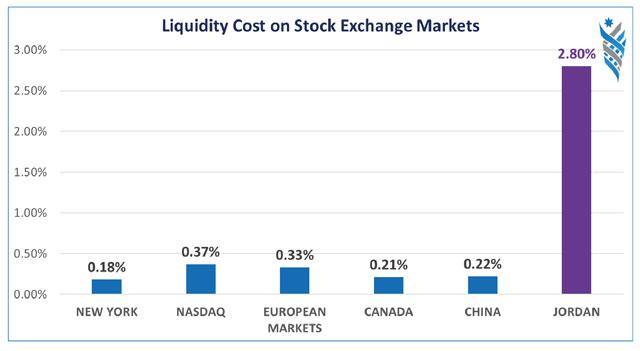You are here
JSF proposes steps to increase liquidity, boosts ASE growth
By JT - Sep 26,2017 - Last updated at Sep 26,2017

Source: JSF study ‘Amman Stock Exchange: The Way Forward’
AMMAN — A paper recently published by the Jordan Strategy Forum (JSF) recommends licensing interested companies to provide liquidity as the companies will play the role of market-makers, according to a JSF statement.
Market-makers are obliged under the law to continuously offer their bid and ask prices, so this will improve liquidity, the paper said.
In its paper entitled “Amman Stock Exchange [ASE]: The Way Forward”, the forum has made several recommendations geared at promoting the market’s growth.
The licensing of companies does not have to be applied to all listed companies at once.
The market can start by selecting a list of companies. Evidence shows that such a move increases liquidity (trading volume), reduces liquidity cost (bid-ask spread), and reduces volatility (improves price stability), the forum’s paper, focusing on market performance since its establishment in 1978 indicated.
Reducing the “minimum tick” from the currently existing multiples of one piaster to half of one piaster, for example, is another step that can help reduce liquidity cost, the forum’s paper suggested.
Furthermore, encouraging companies to “reverse split” their stocks will bring their prices up, and reduce liquidity cost, the paper said.
The fact that more than one hundred listed stocks are priced at less than one dinar means that any change in their prices, by definition, is considered large percentage changes, according to the forum’s statement.
Short selling, the sale of a security that is not owned by the seller, or that the seller has borrowed, is also recommended. Once the market improves in its liquidity dimension, the paper recommends introducing short-selling to improve liquidity even further. Short-selling is allowed in the Saudi Stock Exchange, and other markets of Arab Gulf countries are about to introduce this facility.
The paper also recommends that the government must seriously consider “activating” the secondary market for the issued treasury bills and making it liquid. Such a market is also useful to the listed firms themselves to have a liquid corporate bonds market. Such a market would provide them with an additional source of financing for their capital investments.
The forum’s policy paper examined the ASE because such markets provide economies with financial services which promote real economic growth.
This is why the number of stock exchanges around the world has increased from around 50 in 1975 to more than 170 by the end of 2016, according to the forum’s statement.
The paper was based on several values and indices, like price index, market value of subscribed shares, number of listed companies and turnover ratio.
The forum said the reasons behind the fall in stock prices vary. Irrespective of what they are, the JSF policy paper argues that one main issue that must be dealt with is liquidity.
Related Articles
AMMAN — On the United Nations' International Day of Banks, annually celebrated on December 4, the Jordan Strategy Forum (JSF) issued a polic
Speculators' liquidity is prevailing at the Amman Stock Exchange (ASE), according to the annual report of a prominent Jordanian company.
AMMAN — The Amman Stock Exchange (ASE) will launch its new index the ASE20 index at the beginning of next month, according to a statement fr
















